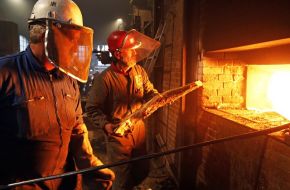Baltic States – CIS, EU – Baltic States, Latvia, Markets and Companies, Metals Market
International Internet Magazine. Baltic States news & analytics
Sunday, 14.12.2025, 11:02
KVV Liepajas Metalurgs rejects reproaches of Soviet-style approach to business
 Print version
Print version |
|---|
The steel company said in a press release that its management in 2015 had indeed repeatedly urged the Latvian government to lower the electricity price so that KVV Liepajas Metalurgs products would be competitive in its main target markets – Scandinavia, Germany, Poland. But the previous owners and managers of the steel company had made similar appeals to the Latvian government back in 2011-12 therefore the current management of KVV Liepajas Metalurgs is baffled by the minister's references to Soviet-style business thinking.
Moreover, other large Latvian companies such as Cemex cement producer, Valmieras Stikla Skiedra fiberglass manufacturer and Latvijas Finieris plywood maker together with the steel company had been calling for the measures to lower electricity cost for energy-intensive companies in the past.
"To ignore deterioration of the situation in the international steel market and to blame the business approach instead is a very crude method for dealing with this complicated situation which might be acceptable in politics but certainly is not effective in business. The true reasons for the crisis at KVV Liepajas Metalurgs are huge amounts of CIS-made steel products offered at dumping prices due to the declining value of the Russian ruble, large supply of cheap products from China where domestic consumption in shrinking and the unfavorable USD/EUR exchange rate. The fact that several EU member states had lowered electricity price for energy-intensive companies has also had negative effects on competitiveness of KVV Liepajas Metalurgs," the company said in the press release.
The steel plant said it was aware of the complicated procedure for receiving the European Commission's approval for different forms of state aid. However, instead of support and understanding, the company had only received an ultimatum from the Latvian government lately. Nevertheless, KVV Liepajas Metalurgs hopes for a continued dialogue with the new Latvian government in recognition of the company's macroeconomic and social importance, the company's representatives said.
Latvian Economics Minister Dana Reizniece-Ozola said earlier that KVV Liepajas Metalurgs apparently was not ready for doing business in the EU and was still wallowing in the post-Soviet attitude when one could easily ask the prime minister for state aid and get it with a single stroke of a pen.
Liepajas Metalurgs metallurgical plant based in the Liepaja port city in south-western Latvia halted production in spring 2013 and was unable to repay a state-guaranteed loan that it had taken from the Italian bank UniCredit. In July 2013, the Treasury paid off the entire loan or EUR 67.465 million from the state budget.
Liepajas Metalurgs was declared insolvent and later sold to Ukrainian investors, KVV Group. Liepajas Metalurgs was renamed KVV Liepajas Metalurgs and officially re-opened on March 6, 2015, but soon started having problems again. In late December, 2015, it missed a payment of EUR 2.7 million to the Treasury, one of the installments to be paid to the Latvian government over the next 10 years, and asked the government for a two-year extension of the payment deadline.








 «The Baltic Course» Is Sold and Stays in Business!
«The Baltic Course» Is Sold and Stays in Business!

